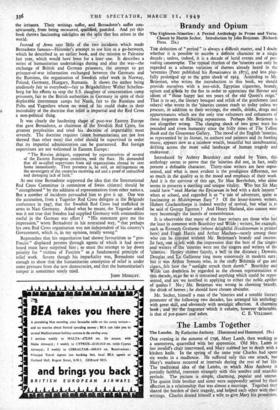Brandy and Opium
THE definition of " period " is always a difficult matter, and I doubt whether it is possible to ascribe a definite character to a single decade ; unless, indeed, it is a decade of lurid events and of per- vading catastrophe. The typical rhythm of the 'nineties can only be regarded as a scherzo variation of themes already heard in the 'seventies (Pater published his Renaissance in 1873), and less play- fully prolonged up to the grim shock of 1914. According to Mr. Betjeman, who writes the introduction to this book, we should provide ourselves with a joss-stick, Egyptian cigarettes, brandy, opium and a• sofa by the fire in order to appreciate the flavour and idiom of " those happy last ten years of the old Queen's reign." That is to say, the literary bouquet and relish of the gentlemen (and others) who wrote in the 'nineties cannot reach us today unless we procure, in addition to their writings, the smells, drinks, drugs and appurtenances which are the only true exhumers and enhancers of those forgotten or flickering reputations. Perhaps Mr. Betjeman is not altogether wrong. The clanging shock of two great wars has pounded and riven humanity since the frilly times of The Yellow Book and the Grosvenor Gallery. The mood of the English 'nineties, as represented by its literati, its authors and painters and its footling music, appears now as a rainbow wraith, beautiful but unsubstantial, drifting across the more solid landscape of .human tragedy and endeavour.
Introduced by 'Aubrey Beardsley and ended by Yeats, this anthology seems to prove that the 'nineties did not, in fact, really present a definable character. Thirty-nine writers are here repre- sented, and what is most evident is the prodigious difference, not so much in the quality as in the mood and emphasis of their work. And it is the survivor of this age, Sir Max Beerbohm, who alone 'seems to preserve a startling and unique vitality. Who but. Sir Max could have " read Marius the Epicurean in bed with a dark lantern" when at school, and regarded it as "a tale of adventure, quite as fascinating as Midshipman Easy"? Of the lesser-known writers, Hubert Crackenthorpe is indeed worthy of revival, but what is to be said of George Egerton ? And Henry Harland, also cannot wear very becomingly the laurels of remembrance.
It is observable that many of the finer writers are those who had the least in common with Beardsley and Wilde writers, for example, such as Kenneth Grahame (whose delightful deadswoman is printed here) and Frank Harris and Arthur Machen—surely among those who can be enjoyed without Mr. Betjeman's brandy and incense. In fact, one is left with the impression that the best of the singers and writers of the 'nineties were not the singers and writers of the 'nineties. Henley chimes faintly, a bell in the distanceDpwson, Douglas and Le Gallienne ring more sonorously in modem ears ; but it was Arthur Symons who, in the stuffy Bbhemia of gas and cigars, felt how the " sunlight struck them dumb." Beardsley and Wilde can doubtless be regarded as the chosen representatives of this decade, 211,§0 far as it contained anything which could be repre- sented, and are we justified in applying to either the noble epithet of genius ? No ; Mr. Betjeman was wrong in choosing brandy, the drink of heroes ; he should have chosen absinthe.
Mr. Secker, himself a man of the 'nineties and a notable literary promoter of the following two decades, has arranged his anthology with great skill, and obviously with nostalgic affection. A charming book ; and yet the- fragrance' which it exhales, however delectable,






































 Previous page
Previous page